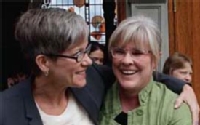19-year Air Force vet challenges ‘don’t ask, don’t tell’
When Major Margaret Witt graduated with a nursing degree from PLU in 1986, she began a highly successful career as a flight nurse with the U.S. Air Force.
She served in the Persian Gulf, including during Operation Enduring Freedom, earning many medals and commendations. She even received a medal from President Bush for her “outstanding medical care.” That career lasted 19 years, yet it ended prematurely. In 2004, Witt was suspended, and by 2007 she was officially discharged under the military’s “don’t ask, don’t tell” policy. The highly decorated flight nurse lost the job she loved simply because she is a lesbian woman.

Margaret Witt, right, and her partner, Laurie McChesney, celebrate as they leave the federal courthouse in Tacoma, Wash. A federal judge ruled that Witt, a flight nurse discharged from the Air Force for being gay, should be given her job back as soon as possible.
What followed was four years of legal wrangling, culminating in a monumental decision at the U.S. Federal Courthouse in Tacoma. This September, federal judge Robert Leighton ruled that sexual orientation does not negatively impact unit morale or cohesion, and that Witt is constitutionally entitled to reinstatement. With the ruling, Witt has won the opportunity to get her job back – though she understands there may be many more years of appeals, perhaps all the way to the U.S. Supreme Court.
More importantly, she acknowledges that she has become the central figure for what many consider a key civil rights issue: allowing gay and lesbian men and women to openly serve in the military.
“I just want to be with my unit,” she said of her battle. “At the same time, I know it is a much bigger issue [than just me].”
Witt had a part in high-profile court cases before – in 2008, the U.S. Ninth Circuit Court of Appeals ruled the military’s “don’t ask, don’t tell” policy could remain in place. However, a test known as “The Witt Standard,” came out of it – U. S. armed services that wished to discharge someone under “don’t ask, don’t tell” had to first prove that his or her conduct hurt morale and unit cohesion.
In the September 2010 ruling, Judge Leighton found that it did not. In the court’s finding of fact, he ruled “no credible evidence was presented to this court which indicated that Major Witt’s sexual orientation ever had a negative effect on the unit morale, order, discipline, or cohesion.”
Witt, in her experience, certainly found that to be the case. “The armed services aren’t given enough credit,” she said. “We can adapt to this. We are the most diverse workforce in the world.”
Of her time at PLU, Witt, who played both softball and basketball, speaks fondly. “I practically grew up on that campus,” she said, noting that many relatives attended PLU, including her siblings and her parents – as well as her great uncle Harold Leraas, of the Leraas Lecture Hall.
“I’ve had tremendous support from PLU, especially from my old professors [in the Nursing and Women’s And Gender Studies],” she said. “At the trial, PLU was very well represented.”


